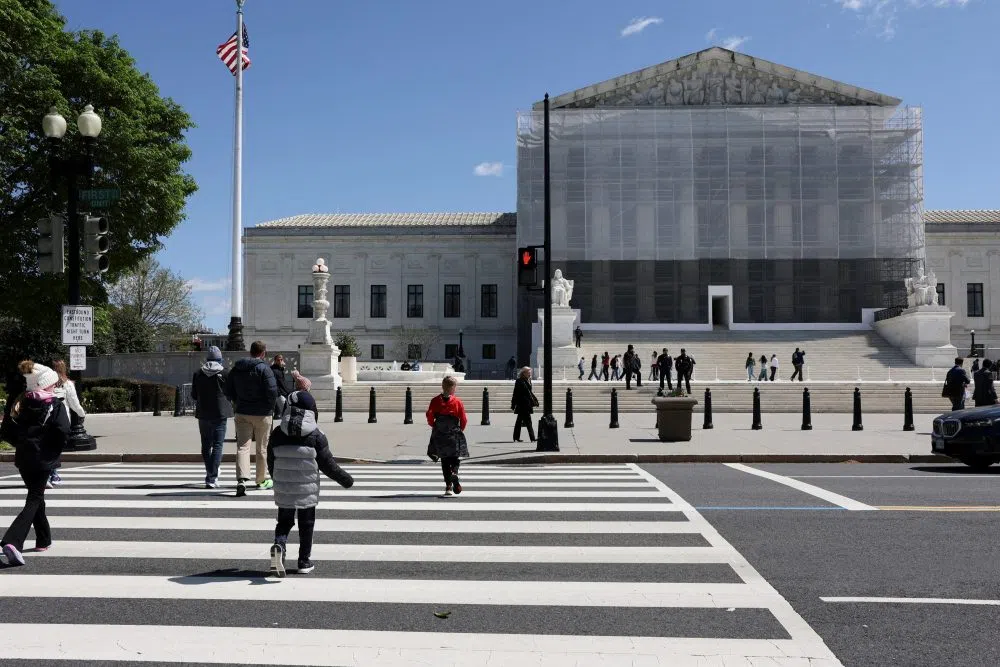WASHINGTON (Reuters) – The U.S. Supreme Court said on Thursday it will hear arguments next month over Donald Trump’s bid to broadly enforce his executive order to restrict automatic birthright citizenship, a key pillar of the Republican president’s hardline approach toward immigration.
The justices, in an unsigned order, did not immediately act on a request by Trump’s administration to narrow the scope of three nationwide injunctions issued by federal judges in Washington state, Massachusetts and Maryland that halted his January 20 order while the matter is litigated.
Instead, the court deferred any decision on that request until it hears arguments in the case set for May 15.
Trump’s order, signed on his first day back in office, directed federal agencies to refuse to recognize the citizenship of children born in the United States who do not have at least one parent who is an American citizen or lawful permanent resident.
In a series of lawsuits, plaintiffs including 22 Democratic state attorneys general, immigrant rights advocates and some expectant mothers argued that Trump’s order violates a right enshrined in the U.S. Constitution’s 14th Amendment that provides that anyone born in the United States is a citizen.
The 14th Amendment’s citizenship clause states that all “persons born or naturalized in the United States, and subject to the jurisdiction thereof, are citizens of the United States and of the state wherein they reside.”
The administration contends that the 14th Amendment, long understood to confer citizenship to virtually anyone born in the United States, does not extend to immigrants who are in the country illegally or even to immigrants whose presence is lawful but temporary, such as university students or those on work visas.
The birthright citizenship order “reflects the original meaning, historical understanding and proper scope of the Citizenship Clause,” wrote U.S. Solicitor General John Sauer, representing the administration.
Sauer said that universal birthright citizenship encourages illegal immigration and “birth tourism” in which people travel to the United States to give birth to secure citizenship for their children.
An 1898 U.S. Supreme Court ruling in a case called United States v. Wong Kim Ark long has been interpreted as guaranteeing that children born in the United States to non-citizen parents are entitled to American citizenship.
Trump’s Justice Department has argued that the court’s ruling in that case was narrower, applying to children whose parents had a “permanent domicile and residence in the United States.”
UNIVERSAL INJUNCTIONS
The administration has used the legal battle over birthright citizenship to press the Supreme Court to tackle nationwide, or “universal,” injunctions that federal judges have issued impeding aspects of Trump’s various executive orders to reshape national policy.
Universal injunctions can prevent the government from enforcing a policy against anyone, instead of just the individual plaintiffs who sued to challenge the policy.
Proponents have said they are an efficient check on presidential overreach, and have stymied actions deemed unlawful by presidents of both parties. Critics have said they exceed the authority of district judges and politicize the judiciary.
Sauer said in a written filing that a “small subset of federal district courts tars the entire judiciary with the appearance of political activism,” issuing 28 nationwide injunctions against Trump’s administration in February and March.
The plaintiffs criticized the administration’s focus on the scope of the lower court orders instead of their conclusions that Trump’s conflicts with the Constitution.
Washington state called on the Supreme Court to reject the government’s “myopic” request given that Trump’s order is “flagrantly unconstitutional,” the state, which sued along with three other Democratic-led states, said in a filing.
“Recognizing that the citizenship stripping order is impossible to defend on the merits, the federal government frames its application as an opportunity to address the permissibility of nationwide injunctions,” the state added.
In asking the court to enforce Trump’s order except against individual plaintiffs who challenged it, Sauer said the states do not have the requisite legal standing to assert the individuals’ rights under the citizenship clause.
In the Washington state lawsuit, brought by the Democratic-led states of Washington, Arizona, Illinois and Oregon and several pregnant women – Seattle-based U.S. District Judge John Coughenour issued his injunction on February 6 against Trump’s order.
During one hearing in the case, Coughenour, an appointee of Republican former President Ronald Reagan, called Trump’s order “blatantly unconstitutional.”
The San Francisco-based 9th U.S. Circuit Court of Appeals on February 19 refused to put the judge’s injunction on hold.
(Reporting by Andrew Chung in Washington; Editing by Will Dunham)




Comments